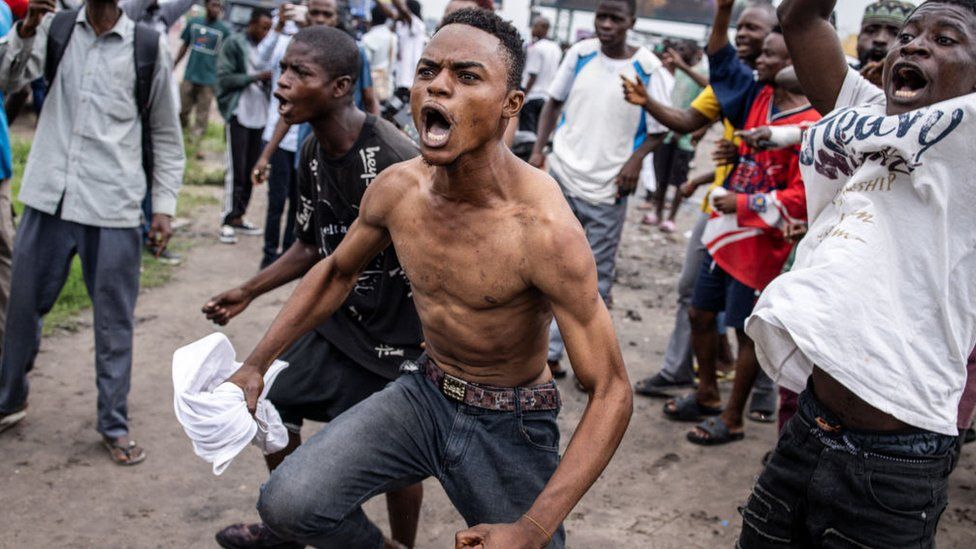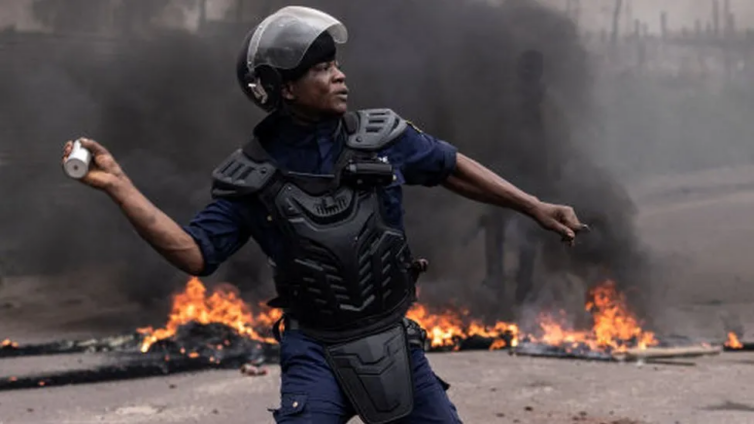Police in the Democratic Republic of Congo have clashed with opposition supporters demanding that last week's presidential poll be annulled.
Leading opposition candidates have denounced the election as a sham and have demanded a rerun.
Several people were wounded as police fired tear gas and threw stones back at protesters in the capital, Kinshasa.
The government banned the protest, saying it would not tolerate attempts to undermine the electoral process.
Election officials have so far not said exactly how many polling stations opened or how many people voted in the 20 December election.
About 44 million people were registered to vote at about 75,000 polling stations.
With just over nine million ballots counted so far, President Felix Tshisekedi is in the lead with almost 80% of the vote as he seeks a second term.
Football tycoon and mining magnate Moïse Katumbi is trailing him with about 16%.
Former oil executive Martin Fayulu, who claims he was robbed of victory in the 2018 election, is in third place with about 4%.
Mr Fayulu's supporters burnt tyres and clashed with police outside his campaign headquarters in Kinshasa.
Police took up positions on key roads in the city and thwarted an attempted march to the headquarters of the electoral commission.
Mr Fayulu said that 11 of his supporters were injured, while police reported two injuries on their side.

GETTY IMAGES
The election was marred by logistical delays and administrative chaos, forcing voting to be extended to a second day in some parts of the country.
The opposition has also accused the electoral commission of orchestrating fraud and ballot stuffing in order to pave the way for Mr Tshisekedi to be declared the winner.
The commission has denied the allegations.
DR Congo is roughly four times the size of France but lacks basic infrastructure. Even some of its main cities are not linked by road.
About two-thirds of the country's 100 million population live below the poverty line, earning $2.15 (£1.70) a day or less.
Voters also chose parliamentary, provincial and municipal representatives, with about 100,000 candidates in total.
The elections were not held in parts of the East because of insecurity.
Dozens of armed groups have been competing to control parts of the region, home to much of the country's vast mineral wealth.
This includes vast reserves of cobalt, a vital part of many lithium batteries, seen as essential to a future free of fossil fuels.
Latest Stories
-
UBA’s LEO becomes Africa’s first chatbot to enable cross-border payments
5 seconds -
Boardroom Governance team engages Chief of Staff ahead of 2025 Summit
7 minutes -
New Bortianor community still grapples with devastating soil erosion
13 minutes -
Battery swapping is the missing link in EV adoption – Here’s what we’ve learned
15 minutes -
I will win hiplife song award with ‘Problem’ in 2026 TGMA – Donzy
17 minutes -
Board membership is about direction, not just prestige – Chief of Staff
38 minutes -
End the Scholarship Waste & Invest in Skills That Build Nations
1 hour -
Ablekuma North chaos: Tony Aidoo slams police failure
1 hour -
6 months is long enough for Mahama to fight galamsey – Tony Aidoo
1 hour -
Be guided by steps to support ongoing recovery without compromising gains – Dr. Asiama tells MPC members
1 hour -
NSMQ 2025: Bawku SHTS withdraws from Zonal Championship after renewed violence in area
2 hours -
A/R: GNFS rescues 16 accident victims in pre-dawn crash at Adansi Kyeaboso
2 hours -
Deploy 1060 soldiers to end ‘galamsey’ menace – Tony Aidoo to government
2 hours -
NSMQ 2025: Ghana SHS returns after early exit as Northern Zonal Championship begins
2 hours -
Is President John Dramani Mahama the New Sheriff in town?
2 hours

